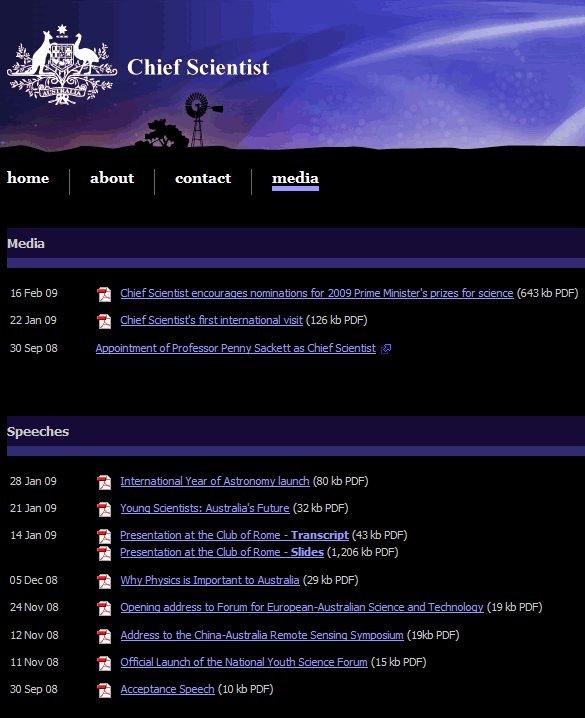|
|
|
|
|
|
|
News & Views item - March 2009 |
![]() Professor Penny Sackett: I'll be the Chief Scientist
for Australia, Not of Australia. (March 16, 2009)
Professor Penny Sackett: I'll be the Chief Scientist
for Australia, Not of Australia. (March 16, 2009)
On September 30, 2008 the Minister for Innovation, Industry, Science and Research, Kim Carr, announced the appointment of ANU Professor Penny Sackett to be Australia's Chief Scientist beginning in November.
Coinciding with Senator Carr's announcement Professor Sackett emphasised that "This role is one of an independent consultant. I'd like to think I'm doing things for Australia. I'll be the Chief Scientist for Australia, not of Australia."
In answer to the rhetorical question Professor Sackett poses on her website: "What is the Chief Scientist?"
She replies:
My official role is to provide independent advice to the Australian
Government. To do this a Chief Scientist wears a number of different hats,
including as a:
* Commissioner of expert studies
* Facilitator for national innovation
* Bellwether of the nation's most important scientific issues
* Communicator within government, between sectors and to the general public
* Advocate for evidence based decision-making
* Ambassador for Australian science on the global stage
5½ months have passed since the ANU professor of astronomy took over the full time position, which TFW was told came with a staff of seven.
As of today, below is a copy the media page on the Chief Scientist's website:

You will also find on the home page a diary of events the Chief Scientist attends but naught of what transpired or accounts of her interactions with attendees.
And as the Chief Scientist for Australia it's past time that Professor Sackett ceased hiding her light under a bushel, and it is more than a bit worrisome that in a major speech on the government's intentions regarding support for scientific research, Senator Carr made no mention of the Chief Scientist. Just because the position has been made full time doesn't lend it additional authority.
Surely, one of the most import tasks of a Chief Scientist for Australia (and for Australians?) is to act as the chief spokesperson for science in bringing an understanding of its importance to the wellbeing of the nation's extant and future citizenry.
Later this week Professor Sackett will be addressing "Science Meets Parliament" the annual attempt by the Federation of Australian Scientific and Technological Societies (FASTS) to bring a rapprochement between scientists and the nation's political representatives; it remains to be seen the importance she places on what she has to say, and what she does as well as says in the coming months.